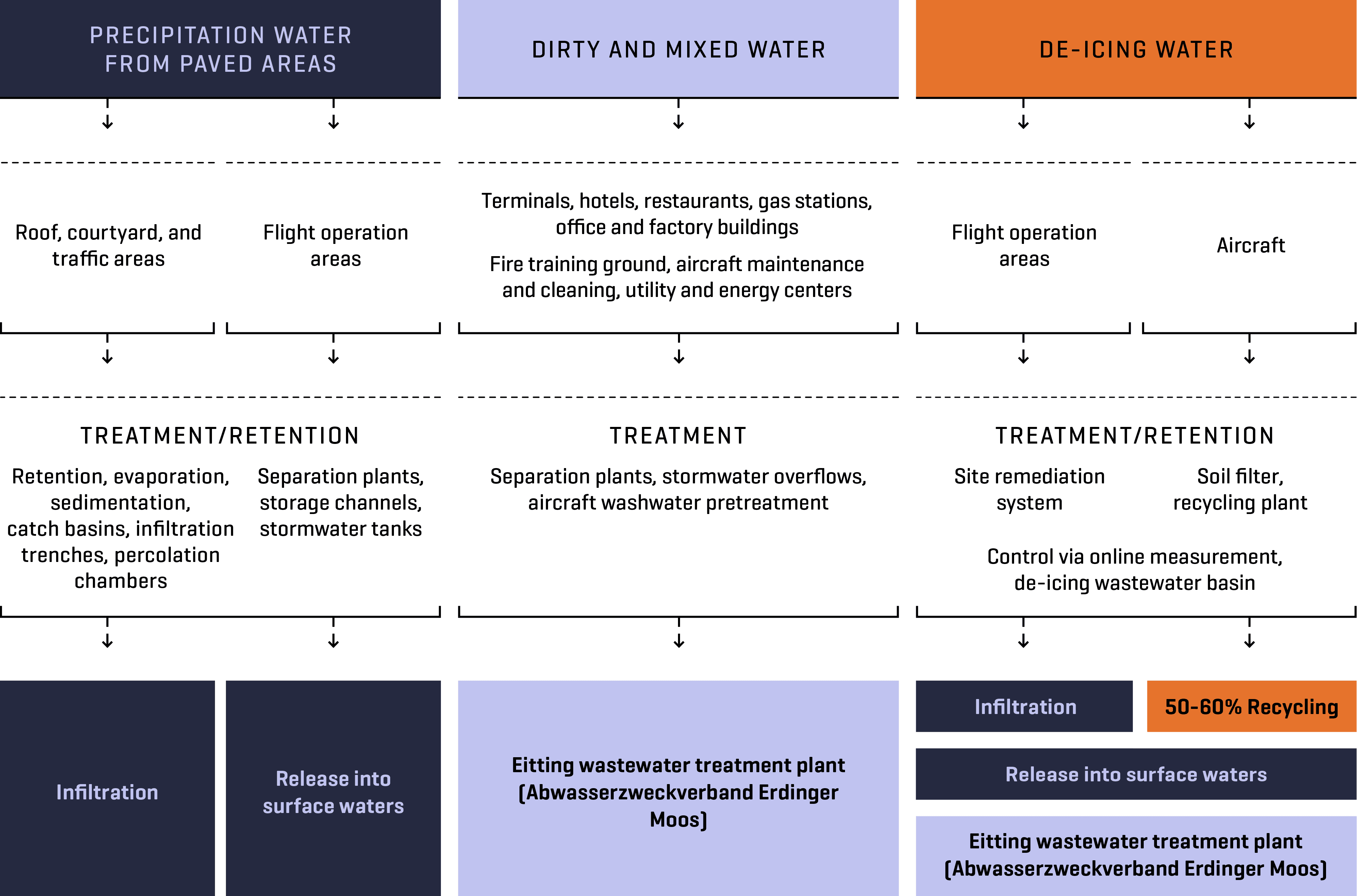Resources
Waste separation: a step toward sustainability
At Munich Airport, waste and recyclables are generated in various areas, such as in the terminals, offices, and on construction sites. Flughafen München GmbH organizes waste management efficiently and sustainably in accordance with the requirements of the Circular Economy Act. The primary focus is on avoiding waste. In addition, we place great importance on separating waste materials by type as precisely as possible, which greatly simplifies recycling processes. Non recyclable waste is sent for energy recovery at the Munich North Combined Heat and Power Plant, where it is used to generate district heating and electricity.
Due to the ongoing growth in passenger figures, the quantities of waste and recyclables rose significantly in 2024. Construction and renovation activities across the entire airport campus also contributed to an increase in construction waste. To continue ensuring sustainable waste management, reducing the volume of waste remains a key task. Individual disposal concepts are being developed to take into account the varying conditions of resident customers and companies.
The increasing demands for responsible waste disposal and the need to conserve environmental resources require carefully thought-out solutions. To improve the quality of waste separation and make the entire disposal process more efficient, we have expanded our waste collection site with a new WHG area. This is a liquid-tight concrete surface constructed in accordance with the German Water Resources Act (WHG) and the regulations of the federal states, designed to protect the soil and groundwater from water-polluting substances. This ensures that hazardous waste such as oils, chemicals, or batteries can be strictly separated from other types of waste during storage. The WHG surface also supports safe and environmentally sound disposal.
Water management: conserving natural resources
The aim of water management at Munich Airport is to affect the natural water balance as little as possible and to minimize any adverse effects caused by water management, drainage, and drinking and firefighting water supplies.
Wastewater disposal concept


Process water reduces drinking water consumption
By 2019, annual drinking water consumption at Munich Airport hovered consistently at around one million cubic meters, despite growth in passenger numbers. Following a pandemic-related decline, drinking water consumption from the Zweckverband zur Wasserversorgung Moosrain increased to 937,339 cubic meters in 2024.
Where drinking water quality is not required, we increasingly use process water: for concrete work and construction site spraying, runway cleaning, sweeper operations, sewer cleaning, and the irrigation of green areas, shrubs, and trees. Additionally, instead of using tertiary groundwater (drinking water), near-surface Quaternary groundwater (process water) from a specially drilled well is used for cooling the West Power Station. Since process water pumping began in 2010, the total savings add up to 3,084,630 cubic meters.
Process water instead of drinking water for air conditioning purposes
Recycling of aircraft de-icing agents
De-icing vehicles keep aircraft free from ice and snow before take-off. The de-icer dripping off the aircraft during this process finds its way via slit drainage gutters and channels into underground basins. At the recycling plant at Munich Airport, it is treated mechanically and chemically to recover type 1 de-icing agents. During the 2023/2024 winter season, the recycling rate was 54.8 percent. Historically, it has ranged between 41 and 60 percent, depending heavily on the amount of de-icing agent used and weather conditions, particularly temperature, precipitation, and evaporation. Due to the severe winter onset in December 2023, we had to apply significant quantities of deicing agent on the apron for aircraft deicing, which could not be routed for recycling.
Aircraft de-icer cycle
Win-win situation: pickle brine for de-icing
Following a trial use of pickle brine for de-icing access and motor vehicle roads on the airport grounds, the liquid is scheduled to be used again in public areas during the 2025/2026 season. All parties benefit from this sustainable winter service concept: the salt-containing brine from pickle production by the company Develey in Dingolfing no longer needs to undergo elaborate disposal processes there but will instead help to clear roads of snow and ice at the airport. This reduces the amount of road salt released into the environment, easing the environmental impact.